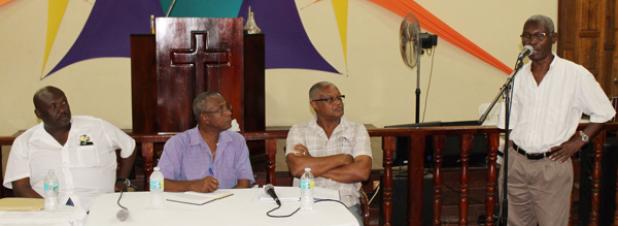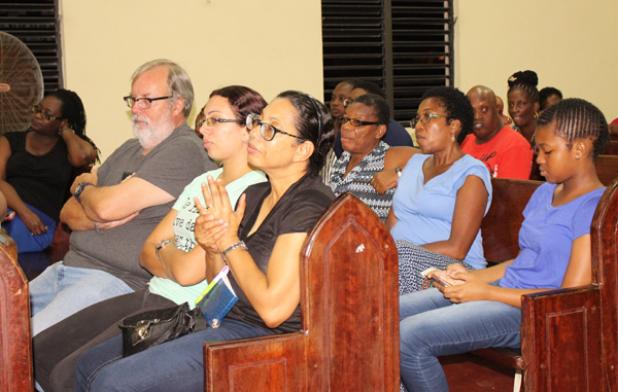
Dr. John Mwansa (right), former general manager of the Barbados Water Authority (BWA), as he spoke at the second town hall meeting convened to address the controversial operation at the Lower Estate Quarry. Looking on (from left) is the man at the centre of the operation, Anderson Cherry, CEO of Project Recycle Ltd.; Member of Parliament for St. George North, Gline Clarke; and Roger Craig, concerned resident and co-ordinator of the town hall meetings.

Concerned and affected residents as they gathered to hear of the progress being made in shutting down the Lower Estate Quarry.
No further threat to water supply
After making a follow-up visit to the controversial Lower Estate Quarry recently and witnessing firsthand the changes being made to the environment there, Dr. John Mwansa says there should be no threat to the local water supply now, given that an agreement has been made for operations there to be halted.
Dr. Mwansa, a former general manager of the Barbados Water Authority (BWA), had earlier raised concerns about the possible threat to the water supply, given the claims of an illegal dump being operated at the quarry by Anderson Cherry, CEO of Project Recycle Ltd. Dr. Mwansa was amongst the host of concerned and affected residents airing their views at the first town hall meeting convened last month, at the Church of God in Salters, St. George.
At the second meeting held at the church recently, which was convened by Member of Parliament for St. George North, Gline Clarke and concerned resident Roger Craig, at which Mr. Cherry was also present, Dr. Mwansa acknowledged that given Cherry’s agreement to halt operations at the quarry and to bring in dirt and other “inert materials” to cover the burning refuse there whilst carting away green waste, plastics and other worrisome materials, the threat to the water supply would decline.
Noting that he took a walk with Mr. Cherry through the quarry on this follow-up visit, given the “very strong smells” pre-viously experienced, Dr. Mwansa stated, “What I saw was a much better environment than I had seen before.”
He added, “It is not the ideal thing I am sure for us to be hearing that inert material will be continually put in there, but it is the best thing that can be done for us, in terms of the groundwater protection because once you have abandoned the Quarry, if the operation is stopped at that point and the hole is left open, it is going to be a dumping place for garbage.”
“So ideally, at the completion of the Quarry, one of the requirements is that you fill it up with inert material, so that … the water (that) has to go down into the Quarry, it will be going through a filter, a bed of rock or material, before the water gets to the Quarry,” he further explained.
“So in my view, we are heading in the right direction. The quantum of material which is already there that they have to address … that was not properly managed, may not have a significant impact on the groundwater, once no additional materials go in there,” Dr. Mwansa commented.
Pointing out that there is no such thing as “pure water” and that “there will be some contaminants”, but they have to be at certain controlled levels for drinking water purposes, Mwansa said it will take a while for an issue to surface with the water supply, with a link to that site.
“It will take about five to six years for leachate from that site, which is in Zone 4, to reach the Belle Pumping Station. So if you were wondering if we might be impacted already, that is not possible,” he told the gathering.
He also stressed that both the BWA and the Environmental Protection Department (EPD) will be monitoring the groundwater supply for pesticides, metals and other contaminants, which could possibly come from the site.
“So at this point, I feel we are moving in the correct direction, once we can maintain the agreed position,” Mwansa stated. (RSM)
